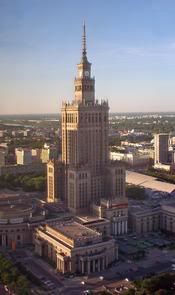Poland's Plea to Europe: Can We All Get Along?
The New York Times:The quip making the rounds of Warsaw in these days of European crisis is that joining the European Union was good for Poland, but it does not seem to have been very good for the European Union.
Indeed, Poland has become a symbol of the risks that many in the richer countries to the west of here believe to be posed by an ever bigger and more integrated Europe - Polish plumbers driving down wages, a ruthlessly competitive Europe stripped of its social welfare benefits.
Poland in this sense falls on one side of a new European divide, between the rich countries beginning to see an ever-expanding Europe as a danger to their well-being and still enthusiastic poorer countries wondering if the club they were invited to join is still willing to live up to its vision.
"The unification of Europe still faces the challenge of a kind of Rio Grande, between rich and poor countries, and if we want to build a unified Europe, we have to get rid of that border," said Bronislaw Geremek, a former Polish foreign minister who is now a member of the European Parliament. He said he was astonished that the richer countries would be so avidly pinching pennies just at the time that eight poorer new members have joined the club.
As if to demonstrate the country's European commitment, the Polish press has widely reported an 11th-hour effort to save the failed Brussels summit meeting a week ago. Prime Minister Marek Belka, who was soon joined by the seven other former East Bloc members, offered to cut some of Poland's subsidies in exchange for an overall budget agreement, an effort that was rejected by the British and the French.
"It was very embarrassing for them," Poland's current foreign minister, Adam Daniel Rotfeld, said in an interview, meaning the countries whose arguments about money caused the collapse of the summit. "Suddenly they realized that the new countries are much more attached to the E.U.'s values than the old founders of the E.U."
"For Poland, political union and the very existence of the E.U. as a new political entity is more important than money," Mr. Rotfeld said.
From the point of view of the Poles, the rich countries have engaged in a narrow-minded, defeatist act of national selfishness, and they have done so just when the European Union's enlargement to 25 members last year promised to complete the revolution that began with the collapse of the Soviet bloc in 1991.
"National egoism won," President Aleksander Kwasniewski said in the wake of the collapse of the Brussels summit meeting.
Read the rest














0 Comments:
Post a Comment
< Main